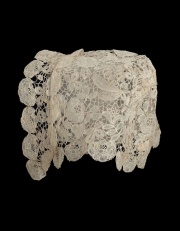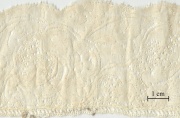Bobbin lace
Jump to navigation
Jump to search
Description
A delicate, and often intricate, hand-woven lace. Bobbin lace was invented by Barbara Uttman in Anaberg, Germany in 1561 and was later widely made in Italy, England, France, Brussels and Ireland. Bobbin lace is still being made by hand in Ireland, Belgium (Kantcentrum) and China. To make bobbin lace, a pattern, often called parchment, is fixed onto a pillow with numerous straight pins. Then the threads, prewound on specially designed spools, or bobbins, are interwoven around the pins using a variety of stitches. As the lace progresses, the pins are moved along the pattern to hold the stitches in place.
Synonyms and Related Terms
dentelle aux fuseaux (Fr.); encaje de bolillos (Esp.); kloskant (Ned); pillow lace; Brussels lace; duchesse lace; Valenciennes lace
Comparisons
Additional Images
Resources and Citations
- Jeff Hopewell, Pillow Lace and Bobbins. Shire Publications, Princes Risborough, Great Britain, 1999.
- Fairchild's Dictionary of Textiles, Phyllis G.Tortora, Robert S. Merkel (eds.), Fairchild Publications, New York City, 7th edition, 1996
- Encyclopedia Britannica, http://www.britannica.com Comment: "Bobbin Lace." Accessed 19 May 2004.
- Edward Reich, Carlton J. Siegler, Consumer Goods: How to Know and Use Them, American Book Company, New York City, 1937
- Random House, Webster's Encyclopedic Unabridged Dictionary of the English Language, Grammercy Book, New York, 1997
- The American Heritage Dictionary or Encarta, via Microsoft Bookshelf 98, Microsoft Corp., 1998
- Rosalie Rosso King, Textile Identification, Conservation, and Preservation, Noyes Publications, Park Ridge, NJ, 1985
- Art and Architecture Thesaurus Online, http://www.getty.edu/research/tools/vocabulary/aat/, J. Paul Getty Trust, Los Angeles, 2000



